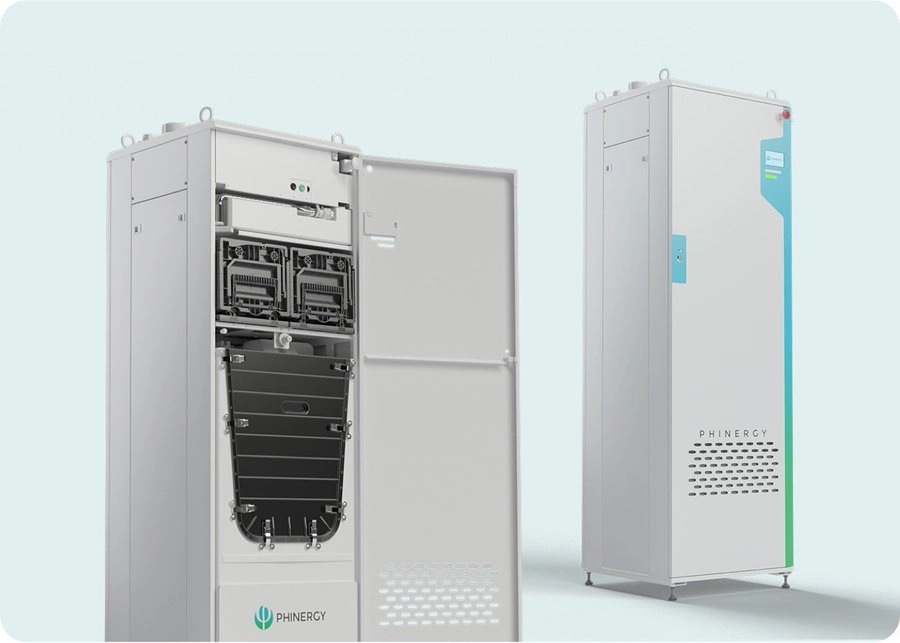Trends
Trends
DEC
22
2022
Environment
Cellnex innovation moves towards renewable and clean energies
Mariana has traded her centrally located apartment in Lisbon for a house in the countryside. Her growing ecological and environmental awareness prompted her decision. Playing on repeat in her head was the phrase “climate change is a reality and is caused by human beings”, a statement supported by the vast majority of the scientific community. So, she decided to do her bit to remedy the situation: recycled materials to build her new home, systems to collect rainwater and optimise water consumption, products sourced from the local economy and, of course, clean and sustainable energy thanks to the photovoltaic panels integrated into the roof of her new home. But one issue remained to be solved: electricity at night and during periods when clouds block the sun. After ruling out a number of environmentally unfriendly options, she found the solution in the innovative batteries that use aluminium as an energy source.
Aluminium breathes green energy
Aluminium is the most abundant metal on earth and reserves of the mineral bauxite from which it is extracted are distributed across the planet. The journey of this light and easily transportable metal begins in large hydroelectric power plants, where clean, renewable energy is used to convert the base ore into aluminium. To extract the stored energy, the aluminium is combined with oxygen from ambient air, using state-of-the-art air electrodes, thus generating an electric current. Aluminium literally breathes. Once the aluminium has been consumed, the end result is aluminium oxide, which is recycled back into pure aluminium that can store energy, and the cycle is closed. The entire process happens from start to finish without generating fumes, pollutants or potentially hazardous substances.
Lagunas de Ruidera Park: The best environment to validate the technology
The Ossa de Montiel site, located in the vicinity of the Lagunas de Ruidera Park in the province of Albacete (Spain), was selected for the pilot project to evaluate and validate the aluminium battery technology. The chosen use case involved employing it as a backup should the main supplying power to the site fail. The old diesel generator, which was noisy and polluting, was decommissioned.
One unit of the tested system can provide up to 4kW, enough to power a medium-sized telecommunications infrastructure, with roughly 20 hours capacity. During the three-month project, tests were run to validate the solution, with interruptions in the main power supply lasting from a few minutes to 10 hours. In every case, the aluminium battery came into operation automatically and provided adequate backup to the main power system.
After completion of the testing period, the aluminium battery system was kept on site with the goal of making it the normal power backup system.
A wide range of energy services – imagination is the limit
According to data published by Eurostat, the average price of energy in Europe hit an annual increase of 27% at the beginning of 2022. The outbreak of the war in Ukraine just added more pressure to the already stressed energy markets. On the other hand, mobile connectivity has become an essential service, with subscribers increasingly demanding the highest levels of quality and continuity of services. The global commitment to climate change and governments issuing regulations to guarantee the resilience of telecommunications infrastructure complete the perfect storm. A perfect storm that yields to a perfect framework to find out the best solutions to provide new energy services, renewable, sustainable and totally independent of the legacy energy sources.
Using aluminium batteries as backup power at a telecommunications site is just one of the many possible applications of this technology. Easy transport and installation mean these batteries can be used with zero environmental impact in rural locations, hard-to-reach areas, offshore sites and generally wherever a conventional power line is technically or economically unfeasible. Even electric vehicles will be able to benefit from this technology, with packs that will allow for extended autonomy when chargers are not readily available.
Open innovation for climate action
The aluminium-battery-as-backup-power-system pilot project was run in collaboration with Phinergy. This Israel-based company is a pioneer in developing aluminium-air batteries and using them as a source of renewable and sustainable energy. The collaboration with Cellnex made it possible to design an optimal test pilot, evaluated and validated in a real operating environment, and to continue developing new use cases and applications of this technology, always with the objective of offering the finest energy services to Cellnex customers.
Manuel Cañete
Product Strategy Manager

















